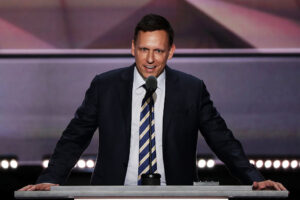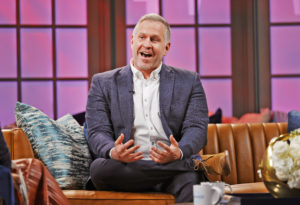Last April, just weeks after he was released from a Romanian prison and placed under house arrest, Andrew Tate revealed his path to redemption. There was no mention of the charges against him, which include sexual exploitation, rape and forming an organised crime group. Nor did he highlight the porn sites, manosphere networks and get-rich-schemes that helped to bolster his fame. Instead, he focused on a remarkable new programme to salvage his reputation. He announced he was becoming a philanthropist.
The self-proclaimed King of Toxic Masculinity, who converted to Islam in 2022, had previously claimed to have funded a number of charitable projects, from establishing a dog shelter in Romania to rebuilding an orphanage, but this was a whole new level of giving. “I donate $25 million a year to feeding children in war-torn countries, especially in the Islamic world, because that’s where war is,” he explained in a video posted to TatePledge.com, which compiles evidence of his alleged good works. “I’m going to be starting a foundation, the Tate Foundation, which is going to be dedicated to charitable acts. I will be spending millions and millions of dollars on charitable acts for the rest of my human life. God has blessed me with fantastic wealth. It’s more money than I will ever personally need.”
In case viewers didn’t get the message, the video then displayed a statement: “This is how the most famous man on earth exerts his influence. Despite all the attacks from his fiercest critics, he is the only one actively trying to change the world for the better.” So, nine months on, how is he doing?
As of yesterday, according to Tate’s website, he and his brother Tristan have donated “$12m+” in “14+” countries in collaboration with “20+” non-governmental organisations (NGOs), and changed the lives of “1,165,340+” people. The site carries details of 43 of the projects they have donated to, the most recent being on December 18, when they helped to provide winter clothes for Yemeni children. Other programmes include the installation of water pumps in African villages, the provision of school meals at orphanages in Somalia, and the handing out of clothes and food parcels in Syria, Gaza and Yemen. Some of these are also supported financially by the War Room, Tate’s online network that charges $8,000 to join.
Looking at these various programmes, it certainly appears that his donations are enabling charity workers to do valuable and much-needed work. There is, however, a catch: there is very little evidence of more than a million lives being changed, or of tens of millions of dollars being spent.
Fewer than 10 charities feature in the videos, and at least one is now defunct. The Tates’ most regular collaborator is Muslim Global Relief, a Manchester-based charity with an income of £3.4 million and three employees. Its deputy managing director Mohammed Bashir told me that Muslim Global Relief had conducted “16 to 20” projects with Tate-donated money this financial year — but that the total amount spent was “£30K at most”. Asked whether the Tate-funded projects were long-term or one-off events, Mr Bashir said: “One project at a time in different places.” The charity, he added, had made a policy decision to carry on taking money from the Tates, regardless of the charges they faced. However, if they were found guilty, Global Muslim Relief would sever all ties.
Oddly, when I asked how the funds were transferred, he said that the Tates’ donations, the choice of projects they fund, and the photo opportunities they presented were handled by a journalist, whom he declined to name. “We don’t have direct links with [the Tate brothers],” Mr Bashir said. “There’s a journalist based here in the UK who’s a representative and looks after the charitable arm for them. He’s the one who gives us the donations, and then we do the projects and give them the appropriate feedback. There’s no ongoing long-term funding for one particular project in one particular country.” (I invited the journalist to discuss his work with me via Mr Bashir, but he didn’t respond.)
In terms of “appropriate feedback” provided by the charities, this usually takes the form of a video in which donors can see how their money has been spent. The Tates then publish this footage on their website — a reputation-enhancing tactic that hasn’t been without criticism. Muslim Hands, a highly reputable charity based in Nottingham with an income of £33 million and a staff of 113, was involved in eight projects with the Tates before they were charged, and now regrets that involvement. “Muslim Hands is extremely concerned that a number of pictures and videos we provided privately to an individual donor to verify the delivery of aid projects by our staff have been used without our authorisation on a website promoting the charitable endeavours of Andrew and Tristan Tate,” the charity told me.
“Given the very serious offences with which the Tate brothers were charged in June, we requested the removal of all this material from the Tates’ website several months ago and made it clear that we would neither welcome nor accept any further donations on their behalf while current proceedings are active. The videos feature eight Muslim Hands projects: three in Niger, two in Mali, and three others in Syria, Yemen and Somalia. It is unacceptable, however, that this material has been used without our formal authorisation to support fundraising by the Tate brothers, to project a positive image of their charitable endeavours as individuals at a risk of damage to our reputation, and to insinuate a level of giving that is not reflected in the relatively modest donations we have received in this case.” Videos featuring Muslim Hands remain on the Tate Pledge website.
Human Appeal, another international relief charity, has also received unwelcome exposure on the Tates’ pledge site. The organisation, which has 500 employees and an income of £43 million, is featured in a food distribution video in Lebanon with posters bearing the names of Andrew and Tristan Tate. Yet it claims it didn’t receive money from the brothers. The charity said: “Human Appeal has never received any donation from a Tristan or Andrew Tate. A member of the public in the UK donated in a legitimate manner and wished to dedicate his donation to the names Tristan and Andrew Tate. Like most charities, donors are permitted to dedicate their donations to third-party names of their own choosing.
“The humanitarian aid distribution photos from the website were taken a while ago at a charity food distribution in Lebanon in aid of vulnerable refugees. These were shared by us with the donor. There was no one in attendance at this aid distribution by the name of Tristan or Andrew Tate, nor would our policy have allowed it.” Nor is Human Appeal the only charity now attempting to distance itself from the Tates. Action For Humanity – International, an NGO based in Salford, launched an internal investigation after I passed details of a video posted to the Tate Pledge website that features an Action For Humanity employee thanking the Tate brothers, the Tate Foundation and the War Room for food and hygiene kits provided after the earthquake in Morocco on September 8. The Tates had been charged with their offences at the time of the donation.
The internal investigation established that the donation was made through the Canadian arm of the charity, and was for just £800. “‘Action For Humanity – Canada’ is a partner organisation of the UK-based ‘Action For Humanity – International’, but is in itself its own legal and operational entity,” a spokesman said. “‘Action For Humanity – International’ has never received funds from the Tates. We can confirm an £800 donation was made to ‘Action For Humanity – Canada’. ‘Action For Humanity – Canada’ has begun the process to return the donation in full.” The charity told me that its due diligence policy requires it to check the source of donations only over £3,000, and added: “As this was a donation of £800 to our Canada office and was made via a third-party charitable crowdsourcing platform [CanadaHelps] which has passed our due diligence process, regrettably the donation was not rejected. A second donation of £12,000 was attempted to be made by the Tate Foundation in November 2023 to ‘Action For Humanity – Canada’. As a result of our due diligence procedures, we did not accept this donation.”
Meanwhile, other charities singled out by the Tates have simply disappeared. The first video posted on the Tate Pledge website was dated to April 13, and features hundreds of construction workers in Dubai receiving boxes of food, courtesy of charity called Life Guided By Light. A similar Dubai-based food handout supported by the Tates, and executed by men wearing Life Guided by Light T-shirts, was carried out in a car park for Chinese National Chemical Engineering Corporation (CNCEC) vehicles. The workers wore high-vis vests bearing the letters CNCEC. Yet when I tried to ask Life Guided by Light why it felt it necessary to feed workers employed by a huge multinational corporation, I discovered that the charity’s three trustees had dissolved it last September following a year of zero income and zero expenditure.
Earlier this week, I showed the Tate Pledge page to two senior academics with expertise in the charity sector. While neither wanted to be named, one expressed concern over the use of “stereotypical images of victims in need that are now being heavily criticised by the NGO community”. The Tate videos, he pointed out, often feature young African children expressing delight at being given a plate of food. The other added: “It seems like a classic case of ‘charity washing’ — trying to bolster a hugely damaged reputation through good works. I suspect many charities wouldn’t touch the money.” And yet, the reality is that the Tate brothers and their War Room associates are funding some worthwhile projects in difficult areas, particularly one benefitting children and orphans in Irbil, Syria, run by the Little Hearts Foundation. The only issue in question is the scale of that funding — and on that, transparency is lacking.
In a June 4 video on the Tate Pledge site, Andrew Tate said: “I promise to provide full accounts and receipts to prove that the money goes directly to charity to feeding children in war-torn countries.” But when I asked Tina Glandian, Tate’s US-based lawyer, if I could see these accounts and receipts, I received no reply. I also emailed the Tates and their associates in Romania several times asking for details of charitable spending but, again, heard nothing back.
Finally, a UK intermediary contacted the Tate team on my behalf. “Unfortunately”, he said, “they have decided not to comment at this time.”
Disclaimer
Some of the posts we share are controversial and we do not necessarily agree with them in the whole extend. Sometimes we agree with the content or part of it but we do not agree with the narration or language. Nevertheless we find them somehow interesting, valuable and/or informative or we share them, because we strongly believe in freedom of speech, free press and journalism. We strongly encourage you to have a critical approach to all the content, do your own research and analysis to build your own opinion.
We would be glad to have your feedback.
Source: UnHerd Read the original article here: https://unherd.com/




